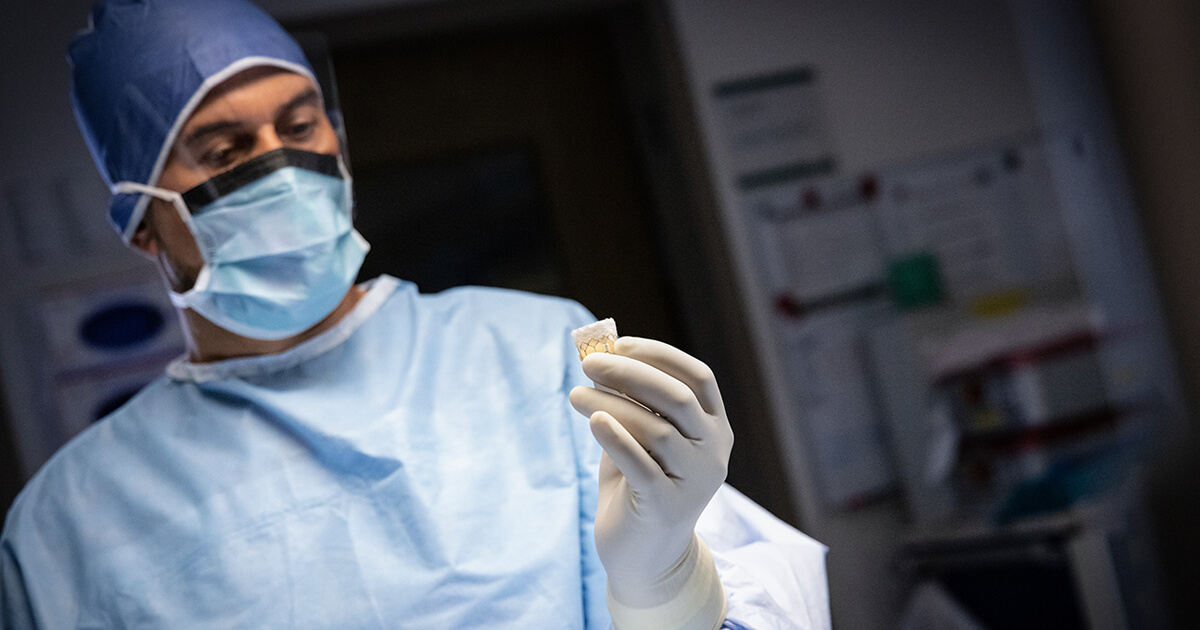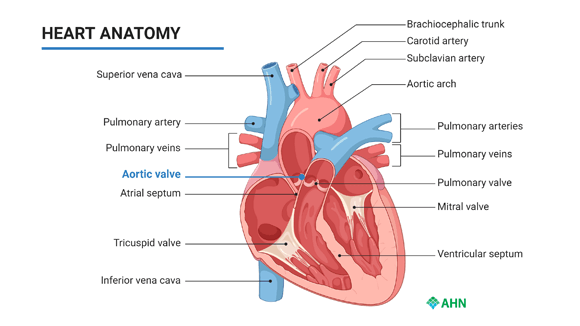TAVR: A life-changing option for heart valve replacement at AHN Jefferson Hospital

The heart is one of your most important organs, pumping blood and oxygen throughout the body. The heart contains valves that keep blood flowing in the correct direction.
When a heart valve stops working correctly, an expert team of cardiologists at AHN Jefferson Hospital is here to help you understand your condition and decide which treatment option might be right for you. If you have a narrowed aortic valve, your doctor may recommend Transcatheter Aortic Valve Replacement (TAVR).
Before we dive into heart valve replacement, let’s talk about how this part of the heart works.
What is the aortic valve?
The aortic valve is one of your four heart valves. It connects your left ventricle with your aorta. It works by opening and closing to let blood flow from the heart to the body.

What is aortic valve stenosis?
Sometimes, due to age, an infection, or a genetic condition, the aortic valve stiffens and becomes narrowed. This is called aortic stenosis.
When the heart valve cannot open enough for blood to flow through easily, your heart is forced to work harder than usual. If left untreated, this can result in heart failure, stroke, blood clots, or sudden cardiac arrest.
Common symptoms of aortic valve stenosis include:
- Shortness of breath, especially when doing daily activities.
- Chest pain.
- Loss of consciousness.
- Leg swelling.
A minimally invasive treatment for aortic valve stenosis
TAVR is a minimally invasive procedure that offers significant advantages over traditional open-heart surgery. Here’s how it works:
- The procedure – During TAVR, a flexible tube called a catheter is inserted into a blood vessel in the groin or leg area and threaded up to the heart. This is known as cardiac catheterization, which allows access to remove the old valve and place the new one through a small incision. This avoids the need for a large incision in your chest.
- Advanced imaging – After the valve is replaced, your cardiac team will use advanced imaging techniques to ensure the new valve is correctly placed and functioning properly.
- Symptom relief – Some patients report feeling relief from symptoms within hours of the procedure.
Preparing for a TAVR procedure
Before any cardiac surgery, your cardiologist will conduct a full evaluation to determine the best approach for your specific needs. This includes a physical exam, blood tests, and a review of your medical history.
Your cardiologist will also order a variety of tests, like:
- Electrocardiogram (ECG) – assesses the heart’s rhythm, rate, and electrical conduction.
- Echocardiogram – uses sound waves to visualize your heart.
- CT scan – creates detailed images of your body’s organs, bones, and blood vessels.
Before surgery, you’ll meet the cardiac team who will perform your procedure – including your surgeon, anesthesiologist, and nurses – so you can ask questions and learn more about what to expect.
At home, you may need to adjust certain lifestyle factors leading up to your procedure. This can look like adjusting your current medications, stopping exercise, or following a specific diet. Be sure to ask your doctor for specific instructions.
The road to recovery
After your procedure, you’ll be monitored until you’re ready to return home. TAVR recovery time is generally faster than traditional open-heart surgery. Many patients are able to walk around within hours of the procedure, and some patients can even go home the same or the next day.
Your doctor will work with you to manage any pain and watch for signs of infection. They may also refer you to a cardiac rehabilitation program to help you regain strength.
Even after you start feeling better, keep going to follow-up visits to track your progress and stay on the path to recovery.
Committed to cardiac care
AHN offers leading care in heart surgery and valve repair using advanced technologies, with a strong focus on patient care and improved health outcomes. Schedule an appointment with Jefferson Hospital’s cardiology team today.
About Kyung S. Park, MD
Dr. Park is division chief of cardiovascular surgery at AHN Jefferson Hospital. He specializes in surgical care for patients with heart issues, offering cardiac, vascular, and thoracic surgery. He graduated from University of Chicago, Illinois, and earned a medical degree from Hahnemann University School of Medicine, (now Drexel University College of Medicine) in Philadelphia, Pennsylvania. He also completed a residency at St. Luke’s – Roosevelt Medical Center in New York City, New York. He is certified by the American Board of Surgery and the American Board of Thoracic Surgery.
The Allegheny Health Network (AHN) Cardiovascular Institute at Jefferson Hospital, near Pittsburgh, features cardiology doctors with comprehensive cardiovascular suites, catheterization labs, and an electrophysiology program. Our center has received top national and professional recognitions for successful heart surgeries and high-level heart attack care.

